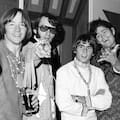The first case of a degenerative brain disease linked to constant head knocks in a New Zealand professional rugby player can be revealed.
Billy Guyton, a former Super Rugby player, Māori All Black and Tasman Mako halfback, died at 33 of a suspected suicide in 2023.
A detailed examination of his brain by the Neurological Foundation’s Brain Bank has now showed he had stage 2 Chronic Traumatic Encephalopathy or CTE.
His father John Guyton told 1News today: “It’s sad that it’s taken so long to understand how terrible it must’ve been for Billy who struggled on a daily basis with the frustration of knowing he was unwell but not getting any answers from ACC, doctors and specialist who could have helped him.”
A growing worldwide consensus of scientists believe CTE is caused by repeated blows to the head, but NZ Rugby and World Rugby are yet to accept that link.
The co-director of New Zealand’s Brain bank, Professor Maurice Curtis, said: “The diagnosis of a young person with CTE is significant as it indicates how early in life the brain has been affected by head knocks.
“The impact on the individual is profound in that it robs them of some of their potential.”
Symptoms only worsen as patients get older, Curtis said.

Progressive dementia
People with CTE suffer memory loss, aggression, confusion, depression, severe anxiety and eventually, progressive dementia.
Guyton retired from rugby in 2018 because he’d received many concussions.
He told the Nelson Weekly Newspaper at the time that he’d battled bi-polar disorder but the concussions had brought constant headaches and nausea as well as blurry and double vision.
It meant he even struggled to play with his two-year-old daughter.
“How cruel it is for Billy to have endured so much prior to his death,” his father said.
Former All Black prop Carl Hayman also suffered from memory lapses, anger, alcohol abuse and suicidal thoughts before he was diagnosed with early-onset dementia and probable CTE.
CTE can only be diagnosed after someone dies.
Hayman is one of around 250 players suing World Rugby for failing to protect them from permanent injury caused by repeated blows to the head.
In 2023, the brain of Justin Jennings, the first Kiwi diagnosed with CTE, was brought back to New Zealand from America and now resides in Auckland’s Brain Bank.
“We are working hard to make sure the best research is available for others who have had repetitive head injuries that may be contributing to neurological symptoms.” Curtis said.

Guyton (Ngāpuhi, Ngāti Pikiao, Ngāti Raukawa) was born and raised in South Canterbury. He began his provincial career with North Otago and went on to make 52 appearances for Tasman between 2013 and 2017. He played for the Hurricanes, Crusaders and Blues Super Rugby teams as well as two games for the Māori All Blacks.
“We hope that more recognition will now be given to others on this journey and looking for answers,” said John Guyton. “Other families should never have to go through what Billy and our family have.”
In a statement NZ Rugby acknowledged the Guyton family and their loss, and the on-going grief surrounding his death.
"We share the family’s concern at his diagnosis. Any time the rugby community loses a member, especially someone as young and talented as Billy, it is felt deeply.
"NZR is concerned about the possibility that repeated head impacts during participation in rugby may contribute to neurodegenerative diseases in later life.
"NZR continues to prioritise player safety which reduces and mitigates against the risk of injury and the exposure of head impacts to participants at all levels.
"This includes the introduction of smart mouthguards, lower tackle height, contact guidelines, law changes, compulsory education for community coaches and many other initiatives."
It was also supporting research into the issue.
























SHARE ME